Lab Members

Research Associate

Amit Vikram
Amit, a.k.a. Vikram, received a B. Tech. in Engineering Physics from the Indian Institute of Technology Madras in 2018, and Ph.D. in Physics from the University of Maryland, College Park in 2024. He joined the group as a postdoc in September 2024.
His research focuses on the dynamics of complex quantum systems (often called “quantum chaos”) and its close two-way symbiotic relationships with statistical mechanics, quantum information, and quantum gravity. He is especially interested in developing a conceptual understanding of aspects of quantum dynamics that have been particularly mystifying (e.g., ergodicity, thermalization, information scrambling, complexity), exploring both their fundamental theoretical relevance and applications/accessibility in experiments, with the latter providing a crucial litmus test for which concepts are of more immediate operational interest.
Amit’s hobbies tend to revolve around keyboards and mice, including playing the piano and playing video games, reading books or just random facts online, listening to music and some casual coding, when he isn’t just staring off into the (preferably night) sky. He also allegedly has a penchant for verbosity.
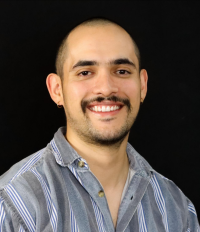
Diego Fallas Padilla
Diego is a Costa Rican physicist with research interests in quantum optics, open quantum systems, and quantum metrology. He earned his B.Sc. in Physics from the Universidad de Costa Rica in 2017 and completed his Ph.D. at Rice University in 2024. At Rice, he worked under the supervision of Dr. Han Pu, conducting research on quantum criticality in generalized versions of cornerstone quantum optics models such as the Dicke and Rabi models.
As for his research style, Diego enjoys working on versatile projects that combine analytical modeling with numerical methods. He values close collaboration with experimental groups, while also taking interest in developing theoretical tools that support and enhance fundamental research efforts.
He joined the Rey group as a postdoctoral researcher in September 2024, where he focuses on multi-level atoms interacting with light in cavity QED systems. His work aims to generate non-classical states for use in quantum metrology and to explore quantum simulation of complex spin models.
In his free time, Diego enjoys playing football (soccer) and attending concerts or other music-related events.
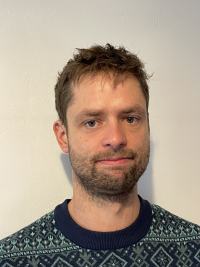
Raphael Kaubruegger
He earned my B.Sc and M.Sc in Austria at the University of Innsbruck. During my master's program, he visited the University of Gothenburg in Sweden, where he conducted research on neural network-inspired variational wavefunctions for quantum many-body problems under the guidance of Prof. Jan Budich.
Subsequently, he started a Ph.D. at the University of Innsbruck and the Institute for Quantum Optics and Quantum Information (IQOQI) Innsbruck, supervised by Prof. Peter Zoller. My Ph.D. research centered on the application of variational quantum algorithms in the field of quantum metrology. The aim was to optimize parameterized quantum circuits for the generation of entangled states, such as squeezed states, and to enable measurements in an entangled measurement basis.
At the beginning of 2024, he joined Prof. Ana Maria Rey's group at JILA with the aim of developing innovative protocols for the quantum platforms being developed at JILA.
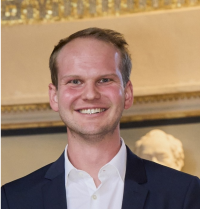
Lukas Homeier
Lukas has earned his B.Sc. in physics from LMU Munich before he worked as an experimentalist in Munich and Stanford. Afterwards he switched into a Master’s in Theoretical and Mathematical Physics and obtained his PhD in theoretical physics from LMU Munich under the supervision of Prof. Fabian Grusdt, during which he also spent extended time as a researcher at Harvard.
Lukas is currently a Simons postdoctoral fellow of Ultra-Quantum Matter. He is interested in the intersection between quantum simulation and strongly-correlated systems. His research develops novel protocols to emulate models of high-energy and condensed-matter physics, such as lattice gauge theories, in AMO platforms, in particular Rydberg tweezer technology. A focal point of this research is to find new theoretical insights into synthetic quantum matter in- and far-from-equilibrium.
In this life outside of JILA, he enjoys (trail) running, camping, beer and airplanes.
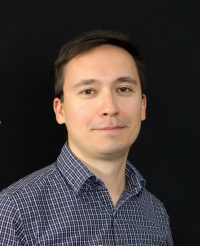
Matjaž Kebrič
Matjaž finished his bachelor’s degree in physics at the University of Ljubljana. He then moved to Munich, Germany, where he completed his master’s degree at the LMU Munich. He remained in Munich to pursue his PhD in physics under the supervision of Prof. Fabian Grusdt, focusing on confined phases in lattice gauge theories coupled to matter.
His broad research interests are strongly correlated many-body systems and quantum simulation of such systems. He likes to solve physics problems using numerical simulations employing matrix-product states and developing effective theories of complex problems.
He joined the Rey group in the fall of 2024 as a postdoc. His main research focus at JILA is the theoretical study of the dynamics of doped, strongly interacting many-body systems, which can be simulated in optical experiments.
In his free time, he enjoys hiking and climbing.
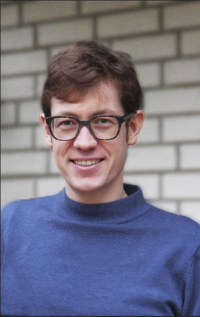
David Wellnitz
David Wellnitz is broadly interested in the interface of atomic and molecular physics with quantum technologies, and the numerical simulation of quantum many-body systems. Following his undergraduate and masters studies at Heidelberg University in Germany, he moved to the University of Strasbourg in France to pursue a PhD in physics in the group of Johannes Schachenmayer and Guido Pupillo in 2018. In his PhD, he developed numerical methods to study quantum many-body dynamics and applied them to investigate how the interaction of molecules with light confined in optical cavities modify their chemical reactions. He joined the Rey group in March 2022 as a postdoctoral researcher. Here, he studies quantum many-body dynamics of molecules at temperatures near absolute zero for quantum simulation.
Outside of physics, he enjoys a good game of chess and likes to go hiking.

Youcef Baamara
Youcef Baamara is originally from the M’zab Valley, a beautiful oasis city in southern Algeria. He is a PostDoc in the Rey group since September 2024. His research focuses on ultracold atoms and quantum metrology, with particular interest in studying relativistic effects in optical lattice clocks and spin-exchange interactions in dipolar quantum gases. Before joining JILA, he obtained his Ph.D. in Physics from Sorbonne University Paris, where he carried out his research on quantum correlations and quantum metrology at Laboratoire Kastler-Brossel under the supervision of Prof. Alice Sinatra and Dr. Manuel Gessner. He also holds a Master’s degree in Physics from Sorbonne University and a Bachelor’s degree in Fundamental Physics from Houari Boumediene University of Science and Technology Algiers. His scientific interests center on understanding the behavior of many-body quantum systems and harnessing their properties for technological applications.
Graduate Student
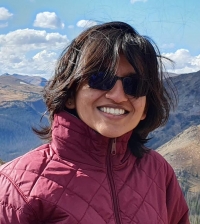
Sanaa Agarwal
She graduated from Birla Institute of Technology and Science, Pilani (BITS Pilani) in Rajasthan, India with a double-major in Physics and Mechanical Engineering in 2019. She joined CU Boulder as a graduate student in 2019 and joined Prof. Rey's group in the summer of 2020. She is currently working towards understanding the effects of dipole-dipole interactions in multi-level atoms and drawing comparisons with the widely-studied case of two-level atoms in optical lattices. The understanding of light-matter interactions in these systems is pertinent to experiments involving alkaline-earth atoms with hyperfine levels and a degenerate ground-state manifold.
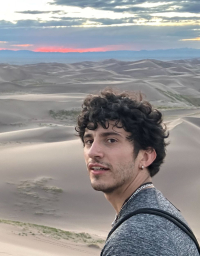
Jose-Daniel Bernal
He graduated with honors from Universidad Nacional de Colombia in 2024, working on using quantum sensors for probing physics beyond the standard model.
Broadly, his interests are in understanding many-body quantum systems, their different phases and entanglement dynamics, and using this to comprehend and engineer quantum simulators and computers. His current research focuses on the dynamics of large spin atoms in optical lattices, addressing the complexity coming from strong dipolar interactions comparable to the contact interactions between the atoms.
Outside of physics, he plays music, enjoys exercising, and the outdoors.
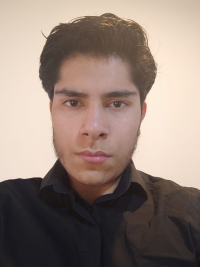
Edwin Chaparro
He earned his BSc in Physics from the Universidad Nacional de Colombia in 2018. He began his PhD in Physics at the University of Colorado Boulder in Fall 2020 and joined Prof. Rey’s research group at JILA in Summer 2021, collaborating with experimental groups to integrate theoretical models into ongoing experiments. His interests center on computational and numerical modeling of many-body quantum systems. He is currently focused on leveraging dissipative processes and symmetry-protected protocols to generate and optimize spin squeezing by engineering dissipation-induced superradiant transitions in cavity QED; and implementing phonon-mediated schemes for quantum-information tasks such as quantum teleportation of collective spin states using ion traps as platform. He is also exploring black-hole–inspired algorithms on trapped-ion for applications of information scrambling.
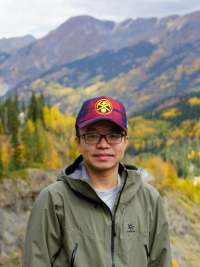
Yongju Hai
He received his B.Sc. and M.Sc. in physics at the Southern University of Science and Technology in Shenzhen, China, and subsequently joined the group as a Ph.D. student in 2023 Fall.
His interest lies in the intersection of quantum information physics and its practical applications in solid-state and AMO systems. He is excited about the controllability and versatility offered by the cold atom system to uncover new insights into many-body phenomena and enable novel applications such as precision metrology. He is currently working on understanding and manipulating dipole-dipole interactions in multi-level atoms in optical lattice clocks.
Outside of physics, he enjoys the outdoors, climbing, skiing, music, and trying new things.

Jaeyong Hwang
Jaeyong (goes by Jay) graduated from Korea Advanced Institute of Science and Technology (KAIST) with BS degree in physics major in 2023. During his undergraduate program, he worked on theoretical study of combinatorial optimization problem solving with Rydberg atom array using adiabatic passage, QAOA, etc. After joining the group at the end of 2023, he focuses on the study of controlling motional state of neutral atoms trapped in optical tweezers by parametrically modulating the potential.

Xianliang Lu
He earned his B.Sc. in physics from Huazhong University of Science and Technology in 2021. He then pursued graduate studies at Sun Yat-sen University, receiving his M.Sc. in 2024. During his master’s program, he worked on controlling topological edge states with waveguide QED and developed the theory for chiral dynamics in coupled quantum systems.
With a strong interest in the interplay between light–matter interactions and many-body physics, he decided to engage in ultracold-atom research. He began his Ph.D. at the University of Colorado Boulder and joined Rey’s group at the end of his first year in 2025. He currently investigates collective spin dynamics and quantum simulations in cavity QED systems.
He holds the highest esteem for Socrates, Confucius, and Jesus — though all he knows of them could fit into a margin note.
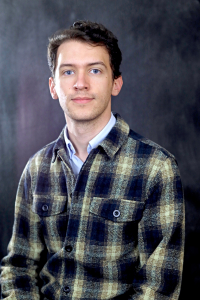
Conall McCabe
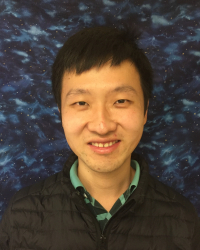
Haoqing Zhang
He earned my B.Sc in Physics from the University of Science and Technology of China in 2020. Subsequently, he started my Ph.D in Physics at the University of Colorado Boulder in fall 2020, and joined Professor Rey's research group one year later. His research interests are centered around quantum simulation and meteorology utilizing highly tunable quantum many-body systems. Currently, he is focused on the Hamiltonian engineering of quantum spin models using matter wave interferometers with cavity QED systems.



